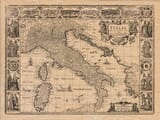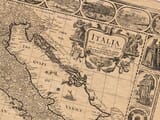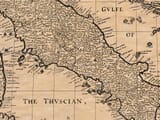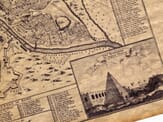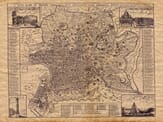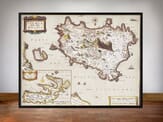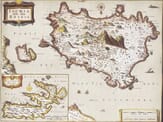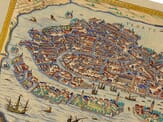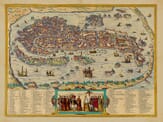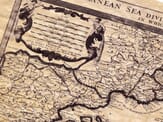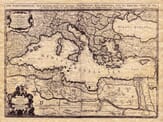Description
John Speed has created enchanting cameos of Verona (the setting for Shakespeare’s Romeo & Juliet), Naples, Genoa, Rome, Venice and Florence that feature along the upper part of the map, and represent probably the very first ‘aerial’ views of these cities. To the left and right are enthralling vignettes further decorating and enhancing this wonderful antique map and illustrating the costumes and cultures of the times. The islands of Corsica, Sardinia and Corfu (Kerkyra) are shown in fascinating detail, as is an intriguing glimpse of Albania in quite extraordinary detail. A splendid map that also serves as an indispensable reference article for any student of Italian or Albanian history.
John Speed added historical notes and his own observations to the rear of his Old Map of Italy which are useful historical documents and often quite amusing. We have transcribed them attempting to retain their original form. We’ve edited archaic place names and certain old spellings and missing letters etc. for clarity.
(1) ITALY is divided from France and Germany by the Alps, and stretcheth herself south-east, betwixt the Tyrrhene and Adriatic Seas, almost in just proportion of a man’s leg. I may spare my Reader her lavish attributes; which he can hardly lack, if he will but look into any Author where her name is mentioned. She must (for me) and well may, be content here with the brief Eulogy of Pliny, to which (I think) the wit of man can add but little. Certainly the most blessed seat of man upon earth can deserve no more.
Italia terrarum omnium alumna, eadem & parens, numine deorum electa, que coelum ipsum clarius faceret, parat congregaret imperia, ritus molliret, tot populorum discordes linguas, sermones, commercia ad colloquia distraheret, & humanitati hominem daret.
[“Italy, foster-child and mother of all lands, chosen by the will of the gods to make even the sky itself more brilliant, destined to gather empires together, to soften customs, to draw into fellowship the discordant tongues, speech, and commerce of so many peoples, and to give humanity to humankind.”]
(2) Yet, to speak truth, we cannot abate her much of this title. The Mother of Countries we may call her, since most Writers agree that she was first inhabited by Janus (or Noah, as some would report him) the Father of Nations. It was doubtless a very long time, since the world was honest; and deserved the name of a golden age: yet then was she peopled (as Justin delivers out of Trogus) by the Aborigines, whose King was first Ogyges, then Saturn, a man so just that under his Government there was known no tyranny from their Prince, no disloyalty from the Subject, no injury from the neighbour: they had all one patrimony, one possession; and where all acknowledge no peculiar, there can be but little cause of strife.
(3) I presume not to set down the just year when men were thus ordered: but if you will believe the story of the Gentiles compared in Chronology, by some of late years and better trust, as Munster, Quade, &c. Janus pater hominum & deorum, and immediate predecessor to Saturn, was in Italy within 200 years after the Flood, and received the aged Chronus into part of his Kingdom with him, being expelled by his Son Jupiter out of Crete. Each of them built a City, and left a sound of his Name for their remembrance: the one Janua, which to this day hath suffered no further change than to Genua; and the other Saturnia; and both in their times gave name to the whole Region; which are not yet fully worn out: though others have since taken place; as Latium quia ibi latebat Saturnus, Italia ab Italo Siculorum rege, Hesperia from the Western Star, Ausonia and Oenotria from her excellent Wines.
(4) But this is the largest scope which we can give to her antiquity. Helricus and other authentic observers of time cut off (well nigh) a thousand years from this account of the Aborigines, and place their Dyxaltia 2622 years after the Creation, 966 after the Flood, and before Christ 1327.
(5) The first change of inhabitants was forced by Evander the Arcadian, a man of that admirable eloquence, that he was called the Son of Mercury, but had by chance slain his Father, and was therefore expelled his inheritance, and advised into Italy by his Mother, a great Prophetess of those times. He removed the Aborigines from their seat, and planted his companions in the same plot of ground, where after Rome was built: and in the Mons Palatinus founded a little Town, which he called Palanteum, in memory of his great Grandfather. And this was about the year 2710.
(6) About sixty years after, Aeneas arrived in this Country from the Siege of Troy, was entertained as an amorous suitor by Lavinia, with consent of her Father Latinus; and after the death of his corrival Turnus, King of the Rutilians, was settled Heir to the Latin Monarchy after his Father.
(7) From Aeneas to Numitor the succession went on (not without some rubs), but suffered no great breach for almost four hundred years. When the title should have fallen to him, being the elder and true Heir, he was spoiled of the Kingdom by his younger Brother Amulius Sylvius: nor could it be recovered till time had given growth and strength to Romulus and Remus his Grand-children by his Daughter Rhea.
(8) The birth and breeding of these two Brothers is well known; we need not enlarge their story further than thus. They were the sons of Rhea, a Virgin which was cloistered up into the Temple of Vesta, by her Uncle Amulius Sylvius, that she might not bring forth an Heir to endanger his Title. Notwithstanding, means was found, so that she conceived at once two children by Mars, and was delivered among her sisters the Vestals. For this herself (as the censure was upon such delinquents) was buried alive: her boys exposed to be destroyed; but were preserved by Faustulus the King’s Shepherd, and nursed by his wife Laurentia, or Lupa for her bad life.
(9) When years and their supposed father had taught them their true pedigree, and the base tyranny of their Uncle, they began with revenge upon him, for their Mother’s quick burial, for their own intended murder, and their Grand-sire’s injury. To be brief, they slew their great Uncle Amulius Sylvius, and returned the Kingdom to the rightful Numitor.
(10) Thus when they had once dealt in disposing of Empires, they could not easily return to the Shepherd’s hook, but bethought them of the like fortune for their own advancement: and stirred not far to make good their purpose, but in the very Mons Palatinus, the place where they sucked their nurse, they drew together a monstrous head of deboshed Shepherds, and built the City, which is now called Rome from Romulus, who, in strife for the name, or (as some say) for a disdainful skip over the new walls, slew his brother Remus, and was left the sole Founder and Commander of this rascal-crew: for indeed so it was, and held in that contempt by her borderers, that they could not by entreaty get wives from them to continue their succession, till by a guile they had enticed the Sabines to their pastimes, ravished their women, and afterward by degrees either made their peace, or won it with the Sword, from the people round about them.
(11) Thus began the Empire of Rome, and was governed at first by seven Kings in a direct succession to Tarquinius Superbus, who lost both himself and Kingdom by his own pride, and his Son Sextus’s rape upon Lucretia. It was next taken up by Consuls, two annually chosen out of the Patritii, or principal Citizens. The third rank were of Decemviri: but they again were dispossessed for the like rape of Appius upon Virginia, and Tribunes were constituted of Consulary authority. Then Consuls again in another course; and for a time Dictators: which when Caesar had once clasped, he soon made to himself a power Imperial: and (though after five years it cost him his life, which he exchanged with Brutus and Cassius for twenty-three wounds in the Senate-house) yet the liberty of Rome was never so fully recovered, but that soon after the Government fell upon Augustus, by the death of Antony, and deposing of Lepidus, who for a while were joined with him into the Triumvirate.
(12) This hold was scarce ever lost clearly to this day: though by the changing of the seat Imperial from Rome to Byzantium, in the reign of their forty-third Constantinus; by the division into the Eastern and Western, in the time of Theodosius; by the many invasions of the Goths, Huns, Vandals, Alani, Burgundians, and Lombards, it comes now far short of that full glory in which it once shined.
(13) Yet is Italy still as before a happy soil, pleasant and fertile; at all times moderate weather and healthful air, full of variety as well of living creatures, as Plants, Corn, Wine, Oil, Linen, Herbs, &c. And can afford into other Countries, Rice, Silks, Velvets, Sattins, Taffetas, Grograms, Rash, Fustians, Gold-wire, Armour, Alum, Glasses, &c. The rich are very rich: for wealth will come, with much labour, in great abundance: but the poor are extreme poor: for they are most of them very idle.
(14) Her chief Rivers are Padus or Po, Athefis, Rubicon, Tiberis, Arnus, &c. and her chief Mountains are the Alps and Mons Appenninus. The first are in height five days’ journey, covered with snow, and from thence have their names a nivibus albis. They have two passages from Germany into this Country, and three out of France: from Germany by the Valtelline and by Trent; out of France through Provence and Liguria, through the hills of Geneva to Lombardy, and through the Country of Turraine. The Appennine mountain runs at length with Italy, like the ridge of a man’s back, and is called indeed Spina. The measure of Italy is from North-west to South-east about 1020 miles, and from the two Seas cross in some places 410.
(15) The Inhabitants are of a sad temper, solid judgment, witty, politic and frugal: yet they are as deeply engaged to their peculiar vices; hot lechers, and those seldom stand quit from that horrible torture of jealousy over their Wives; for it measures others’ actions by its own rule. Both in them are incredible: and make treachery and murder seem no fault in their eye, if they be provoked by suspicion. Little friendship with them but for advantage: and a man must beware that he venture not further upon those terms than he may well step back, lest he be betrayed (perhaps forced) to a love worse than their hate: for they are most unnatural in their lust. The women when they have their free liberty differ not much, but their close keeping either hinders, or at least hides their faults, so as they appear modest, lovely, and witty, for as much as they dare speak.
Description of an Old Map of Italy continues to second page:
(16) For War and Learning, it bred in times past the mirror of both: Camillus, Fabius Maximus, Scipio, Pompey, Caesar, Cicero, Livy, Tacitus, Virgil, Ovid, and many hundreds which yet prompt our tongues and pens with examples of goodness in several kinds. Nor hath it lost that glory in this age. For what Nation directs not their travels into these parts, to see, hear, and partake of their excellent Learning, though they compass it with great expense, and venture through dangerous hazards, by reason of their treacherous dispositions, and cruel barbarous usage of such as shall in any light circumstance seem to be averse from their idolatrous superstition. But their Universities are many and very famous: Rome, Ferrara, Naples, Salerno, Venice, Padua, Verona, Florence, Milan, Mantua.
(17) I must omit those many divisions of Italy, made fit by Cato in Appenninam Cisappenninam and Transappenninam, by Pliny in Liguriam, Latium, &c., by Strabo in Venetiam, Lucaniam, Apuliam, Romam, &c., by Ptolemy into forty-five several Nations. We will rest in the latest, which best fits the present state, and numbers ten Provinces:
-
The Kingdom of Naples.
-
The Land of the Church.
-
The Commonwealth of Venice.
-
The Dukedom of Florence.
-
The Dukedom of Milan.
-
The Dukedom of Mantua.
-
The Dukedom of Urbino.
-
The Principality of Parma.
-
The State of Genoa.
-
The State of Lucca.
(18) The first is the Kingdom of Naples in the south part of Italy, and is the most fertile: it is bounded with the Seas unless on that side toward the Papacy. It is of large compass and comprehends many Provinces.
(1) Campania felix, or terra Laboris, and in this stands Naples the Metropolis: and Cumae, where the Sibyl’s Cave was, by which Aeneas went down to Hell. And not far off is the lake Avernus.
(2) Abruzzo, her chief Towns of note are Sulmona and Aquino, the birth-place of our great School-man Thomas Aquinas.
(3) Calabria inferior, the chief City Salerno, an Academy famous for Physic.
(4) Calabria superior, called Magna Graecia, from a multitude of Greek Colonies, which there built Cities, and possessed a great part of the Country. The principal of note was Tarentum.
(5) Terra d’Otranto from her Metropolis Otranto, once Hydruntum. And here stands Brundusium famous for one of the best Havens in Christendom.
(6) Puglia, and her chief City was Arpinum, Tully’s birth-place.
(19) The Land of the Church lies on the west of Naples, and south-east of the Commonwealth of Venice: north and south it crosses from the Adriatic to the Tuscan Sea. Her under-provinces are:
(1) Romandiola: and her chief Cities Bologna, Ferrara, and Ravenna.
(2) Marchia Anconitana, in which stands Loreto, the place where so many miracles are performed by our Lady, as they deliver among the rest of their legends.
(3) Ducato Spoletano, and in this Assisi, where St. Francis was born.
(4) St. Peter’s Patrimony, a large portion: and I believe more than ever he enjoyed, or could leave to his Heirs. Her ancient Towns, well known and often mentioned in the Roman stories, were Alba, the Seat of the Sylvian Kings, and Ostia, built by Ancus Martius, and Tibur, Praeneste, the Gabii, the Veii, and that which bustles for the place above any other in Christendom, Rome herself.
We will not repeat her beginning: she was then but two miles in compass; but after she grew fat, she burnished to fifty miles about, upon the walls seven hundred and forty Turrets, and the Inhabitants innumerable. For those memorable actions which were performed in her under that antick Empire, we will refer the Reader to a particular Description, derived wholly to that purpose.
As it is now, it stands somewhat lower on the banks of Tiber, in the Campus Martius: she retains yet eleven miles round, and two hundred thousand Inhabitants, a great part Friars, and such odd idle fellows, which pretending to Religion, for want of other means to live, cloister themselves up to a single life, only to avoid the charge and incumbrances of Marriage, not to separate themselves from the world or desires of the flesh: for among them they maintain commonly forty thousand Courtesans in good custom, and so rich, that they are able to pay thirty thousand Ducats yearly to the Pope.
The Buildings in which they most glory are the Church of St. Peter, the Castle of St. Angelo, the Vatican Library, and the Pope’s Palace. The truth is, there is Pride enough to attire the Whore of Babylon, as there can hardly be any other meant than Rome: she sits upon the Beast with seven heads: for she was built upon seven Hills, Palatinus, Capitolinus, Viminalis, Aventinus, Esquilinus, Celius, Quirinalis; was ruled first by seven Kings, and hath been since subject to seven several forms of Government if you join the Popedom to those former, which I have now mentioned.
(20) The Commonwealth of Venice, on the north of the Papacy, is a large Territory, and is now as famous for State-policy as it hath been heretofore glorious for warlike achievements. The Inhabitants were first a people of lesser Asia, and assisted their neighbour Trojans in their ten years’ quarrel with the Greeks. So long since they were known by the name of Heneti: and that differs not much from Veneti, as they are now called.
Though they have a Duke: yet it is a free State, and governed by an Aristarchy: for he is ordered to the very clothes on his back by a certain number of the chief Citizens of Venice (for that is their Gentry), and hath his allowance out of their treasury (little enough to keep him from the thought of tyranny) about forty thousand Ducats by the year. The City itself is eight miles round, built upon seventy-two Islands, five miles from the firm land, but for convenience of passage is always furnished with Boats, and hath four thousand Bridges.
Their Arsenal keeps in continual readiness two hundred Gallies. In their Magazine of War, there is ever furniture for one hundred thousand men at Arms. The younger Brothers of the Gentry may not marry to increase the number beyond maintenance: yet to make up their liberty, they allow them stews.
Her Provinces are (1) Marca Travigiana, and her chief Cities are Treviso and Padua (the University best frequented by Physicians, by reason of her rare Garden of Simples), and Verona, with many others. (2) Friuli. (3) Histria. (4) Part of Dalmatia. (5) The islands, Candia, Corsica, Ithaca, Zante, Leucadia, Cythera, &c.
(21) The Dukedom of Florence betwixt the Appennine Mountains on the North, and the Tyrrhene Sea on the South, hath on the West Romagna, and Pisa on the East. A great part of it was Tuscany, and gives yet to their Prince the title of Great Duke of Tuscany. Her chief Cities are Florence, where the most elegant Italian is spoken familiarly, and Pisa, which the Florentines besieged and conquered by the valour of our English Sir John Hawkwood, who raised himself by his brave carriage in the Wars, having been before but a very poor Tailor in Essex; the third is Pistoia, where first began the quarrel of the Guelfs and Ghibellines.
(22) The Dukedom of Milan in Lombardy; on the south of Travigiana, north of Liguria, west of Mantua, and east of Piedmont. A pleasant and rich Province. Her chief City Milan of seven miles compass, the seat of Saint Ambrose his Bishopric.
(23) The Dukedom of Mantua, on the east of Milan, is of circuit not much short of Florence: and her chief Town is Mantua, who may still glory in the birth of that excellent Poet Virgil. It is very strongly situated, and fenced on three sides with water a quarter of a mile broad: and the rest is guarded by a firm wall. And to this Principality belongs the Dukedom of Montferrat in the south-east part of Piedmont.
(24) The Dukedom of Urbino in the midst of the Papal Territories, and upon the north side of the Appennine Mountains. Her principal City is Urbino, the birth-place of another Virgil, though not of equal fame: yet one in whom we have somewhat more interest: for he wrote an English History, being at that time here resident, and Collector of the Pope’s Peter-pence. Besides this here are two hundred Castles. The Rock of St. Leo, Marivol, &c. Some other Towns, as Cabo, Pesaro, &c.
(25) The Principality of Parma on the south of Mantua, and the north of the Appennine: east of Milan, and west of Modena: Besides other Commodities, which she yields in equal plenty with other parts of Italy, sends a special Cheese into other Countries, which we call Parmesan. And her chief City is Parma. This Principate carries with it Mirandola and other Territories, a place oft heard of by the common mention which is made of learned Picus de Mirandola.
(26) The State of Genoa is contracted now from that large compass which heretofore it fetched in. It contained once Liguria and Capua, with the Taurica Chersonesus, Hetruria, and a fair company of Islands in the Greek Seas. Little left at this time upon the main land besides Liguria, and that lieth betwixt the Rivers Varus and Marca, hath the Alps on the West, which divide her from Provence: Hetruria on the East: on the North the Appennine Mountains, and on the South the Tyrrhene Sea. She hath her name from the chief City built by Janus. It is in compass eight miles: and the Houses for two stories high, are built with Marble. The people noble-minded, and forward to any action, be it in the wars by land, or hazard by Sea. One Christopher Columbus is sufficient to make good this Eulogy, for whose birth she deserves to be honored to the world’s end. The Women of Genoa are the most happy of any in Italy; for they may see a Man and speak, and be courted, if not too boldly, without suspicion of their Friends or trouble of their Husbands.
(27) The State of Lucca is in Tuscany, and comprehends the Territories and City Lucca, built by Lucius on the River Serchio. It was once the Rendezvous of Pompey, Caesar and Crassus. Here they joined their Forces in their great attempt. This hath been the Emperors’, the Genoese, the Venetians, the Milanese, and the Florentines’ in their several turns. They now rest under the protection of the King of Spain.


